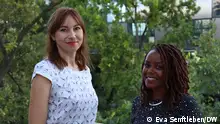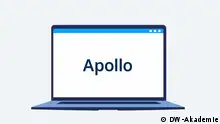Master's Degree
Media Dialogue: A Facebook Revolution?
The role of social and traditional media following the Arab Spring was the focus of a day-long DW Akademie symposium held at Deutsche Welle headquarters in Bonn.
Had it really been a Facebook revolution? What role had online campaigns - including the Khaled Said campaign - played during the Arab Spring? And had social media created a sense of community? DW Akademie together with the Bonn-Rhein-Sieg University of Applied Sciences and the Cologne University of Applied Sciences invited 14 scholars from eight countries to discuss the media's role during transformation processes in the Arab world.
Among those speaking at the third Media Dialogue was Dr. Asiem El Difraoui from the German Institute for International and Security Affairs in Berlin. His research looked at the relationship between traditional and new media in the so-called Arab revolution. Social unrest had sparked the revolution, he said, and not social media. "But," he stressed, "new networks played a major role in spreading information and quickly mobilizing the masses."
Facebook as an alternative to offline activism?
Omair Anas from the Jawaharlal Nehru University in New Delhi, India, agreed. His paper questioned whether Facebook was an alternative to offline activism. He argued that it had expanded activism, citing the campaign protesting the killing of Khaled Said. The death of the young Egyptian had become a symbol for the revolution. When the uprisings began in January 2011, he said, the campaign had more "Facebook friends" than the TV news network Al Jazeera.
PhD candidate Moisés Garduño García from the University of Mexico examined the revolution from a linguistic angle. "The Arab Spring had its own messages, symbols and slogans to express the rise of a new era for the Arab world," he said. The revolution, he maintained, had not only changed the political framework but had influenced language as well.
"This was not a Facebook revolution," summarized Professor Krzeminski, dean of the Bonn-Rhein-Sieg University of Applied Sciences, as he brought the Media Dialogue to a close. The role of social networks in the Arab Spring, he said, needed to be understood "in relation to other media and, most importantly, in relation to cultural and political aspects."
The symposium papers will be published in book form later this year.
- Date 21.05.2012
- Print Print this page
- Permalink https://p.dw.com/p/14zFX
- Date 21.05.2012
- Print Print this page
- Permalink https://p.dw.com/p/14zFX






